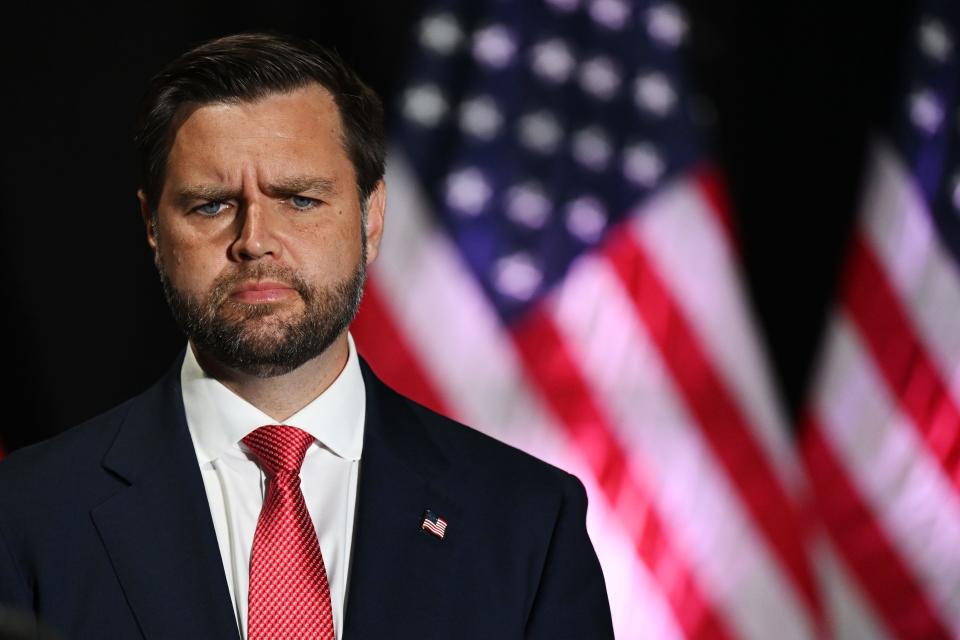JD Vance says he's worried about a 'death spiral' in the US bond market. Here's what he's talking about.

JD Vance warned recently of a "death spiral" in the US bond market.
Vance's concerns are tied to the US servicing its $35 trillion debt load.
"Do they try to take down the Trump presidency by spiking bond rates?" JD Vance asked.
Vice Presidential candidate JD Vance worries about soaring interest rates sparking a "death spiral" in the US bond market that could ultimately "take down the finances of this country."
Vance made the comments in a recent interview with conservative political commentator Tucker Carlson, adding that if he and Trump win the November election, it won't be "smooth sailing for four years" due to the risk of spiking interest rates.
"I really worry about, do the bond markets, do the international investors, the people who are getting rich off of globalization, the people who have gotten rich from shipping our manufacturing base to China, the people who've gotten rich from a lot of wars, do they try to take down the Trump presidency by spiking bond rates?" Vance asked.
Vance's concern stems from the fact that America's servicing of its $35 trillion debt pile was the federal government's fourth largest expenditure in 2023 at $659 billion, up 38% from the $476 billion paid in 2022.
According to the Committee for a Responsible Federal Budget, a bipartisan policy think tank, government spending on net interest on the debt is on track to surpass government spending on defense and Medicare to become its second largest expense in 2024, just behind Social Security.
Vance worries that the spending could balloon even further if bond yields.
"We have call it $1.6 to $2 trillion in debt every single year in this country getting added to the national debt. And the only thing that really makes that serviceable is the interest rates are still pretty low. Right? They're about 4.5% right now. If interest rates go to 8%, and you're actually spending way more to service the debt than you are on actual goods, services and infrastructure for your country, like that can become a huge spiral," Vance said.
As to how rates would spike to 8%, there has long been a fear that foreign countries could dump their holdings of US Treasurys all at once, sparking an imbalance in supply and demand and sending interest rates soaring (bond yields rise as prices fall).
Vance pointed to the 2022 resignation of former UK Prime Minister Liz Truss as an example of how this could play out.
"She came in, she had a plan, and the Bank of England I think made a lot of mistakes, maybe intentional, interest rates shot through the roof and it took down her government in a matter of days," Vance said.
Interactive Brokers chief strategist Steve Sosnick notes that this fear is not new, and Vance is voicing concerns that have acted like a boogeyman for bond market investors for a long time.
"This has been a constant, underlying concern for bond investors for years," Sosnick told Business Insider.
Sosnick said in his own recent conversations with bond investors, discussions "eventually pivoted to when long bond yields might reflect concerns about our ability to service the debt."
He added: "The consensus was, someday maybe it could occur; but who knows when. Though if it does happen, it would likely be rather sudden."
Sosnick said these same concerns had been raised in Japan for decades and they've yet to materialize.
As to the UK's interest rate spike that hurt Liz Truss, that was "specific to the way that British pension funds handled their rate risks, not a flight from the overall credit worthiness of UK gilts," Sosnick explained.
Ultimately, Vance's concern about the US debt and potential for soaring interest rates "is not trivial," Sosnick said, but when it's coming from a politician of either party, investors should take it with a grain of salt.
"Comments like those, if made analytically, can and should be part of a responsible discussion about debt and deficits. But when a politician of either party raises problems without offering solutions it comes off more as scare mongering or blame shifting than a search for responsible policies," Sosnick said.
As to where US interest rates seem to be going in the near future, the answer is lower.
Read the original article on Business Insider
Breaking news
See all






